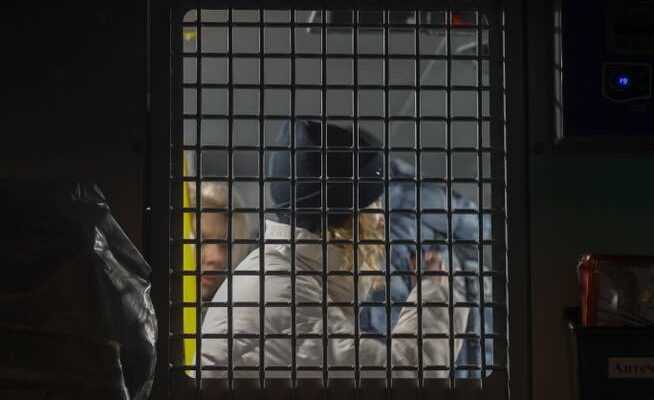In the two weeks since the attack on Ukraine, Russia’s security forces have arrested more than 14,000 people demonstrating against the war. Apparently, more and more police officers feel above the law: they mistreat and threaten.
In early March, several people who were arrested during demonstrations can be seen on a Moscow police bus.
«How should we communicate with you? Polite, cultivated, fast and professional? Or shall we write Article 51? Then there’s slaps, we splash dirty water in your face, we stub out cigarette butts on you. And we have a very long conversation.”
These threats are aimed at Marina Morozova, a 22-year-old Muscovite. She was arrested on March 6 with several thousand others at an unauthorized demonstration against the war in Ukraine. Morosowa managed to record the interrogation – the interrogating officer obviously did not expect it: the recording shows him hitting Morosowa, threatening to shoot her, and saying: “There is no law here. Except my law.”
Already thousands of arrests
The officer was incensed that Morosowa wanted to exercise her right not to testify against herself. Instead of answering his questions, the student cited Article 51 of the Russian Constitution, which enshrines this right.
Released the recording “Novaya Gazeta”, one of the last independent media in Russia. What Morosowa experienced is apparently not an isolated case. The editorial team documented seven other incidents of violence and threats against anti-war protesters at police stations on the same day.
Oleg Koslowski, Amnesty International’s Russia expert, speaks of a new phenomenon: “The police have long used excessive force in arrests. What we are seeing now is abuse at police stations and on police buses.” According to the human rights expert, the Russian police are copying the methods used by their Belarusian colleagues when dealing with critics of the regime.
In the two weeks since Russia invaded Ukraine, more than 14,000 people have been arrested for taking part in anti-war demonstrations or on their way to protests. That’s almost as many as in three months at the demonstrations against the sentencing of regime critic Alexei Navalny a year ago.
Legally holding a demonstration is practically impossible for opposition circles in Russia. At the beginning of March, the law was tightened again, “public acts that discredit the deployment of the Russian armed forces” were made a punishable offence. This makes it a punishable offense in Russia to say publicly that you are against the war. Violators face a hefty fine or even criminal prosecution in the event of a repeat violation.
Human rights organizations can hardly help anymore
The figures on arrests at demonstrations come from the Human rights platform OWD-Info, which operates a hotline for those arrested and organizes legal assistance. Maria Kuznetsova, their spokeswoman, notes that many security forces are increasingly feeling untouchable. Among other things, this is due to the fact that there are fewer and fewer independent media reporting on abuses in police custody.
At the beginning of March, two of the remaining media outlets that were not affiliated with the Kremlin, the Dozhd television station and the Echo Moskvy radio station, had to shut down operations. Foreign social networks such as Facebook or Twitter can practically only be reached in Russia with special technical aids such as VPN tunnels. In this way, security forces run less risk of their abuse of power becoming public in one of these ways.
The Kremlin’s policy of banning critical media and making it impossible for them to work is paying off. The same can be said of human rights organizations, says Koslowski: they are under a lot of pressure and are fighting to survive. This leaves them little time or energy to stand up for the rights of demonstrators.
It is unclear whether there are instructions from above to treat the demonstrators particularly harshly, or whether individual police officers believe that the normal rules no longer apply in times of war. At least it is clear from the recorded interrogations that the tormentors feel empowered to do what they do by the highest authority. «Putin is on our side. You are an enemy of Russia. You are an enemy of the people, »said the interrogator of 26-year-old Alexandra Kaluschskisch. Like Morosova, she was arrested on March 6 and taken to the Brateyevo police station in south-east Moscow. She also recorded the interrogation in secret, and “Novaya Gazeta” published it.
Are the interrogators police or secret service?
If there are instructions to use violence against those arrested, these would at most be given orally, suspects the sociologist Yekaterina Khodschaeva in an interview with «Novaya Gazeta». It is a clear call to break the law. And no superior would sign that, according to the sociologist.
It also remains unclear whether the interrogators are police officers or whether they belong to the domestic secret service FSB or another branch of comprehensive state security. The men are often not in uniform, including Morosowa’s. Either way, the police are responsible, says Amnesty’s Koslowski: “The abuse took place at police stations, and the police are responsible for what happens there.”
